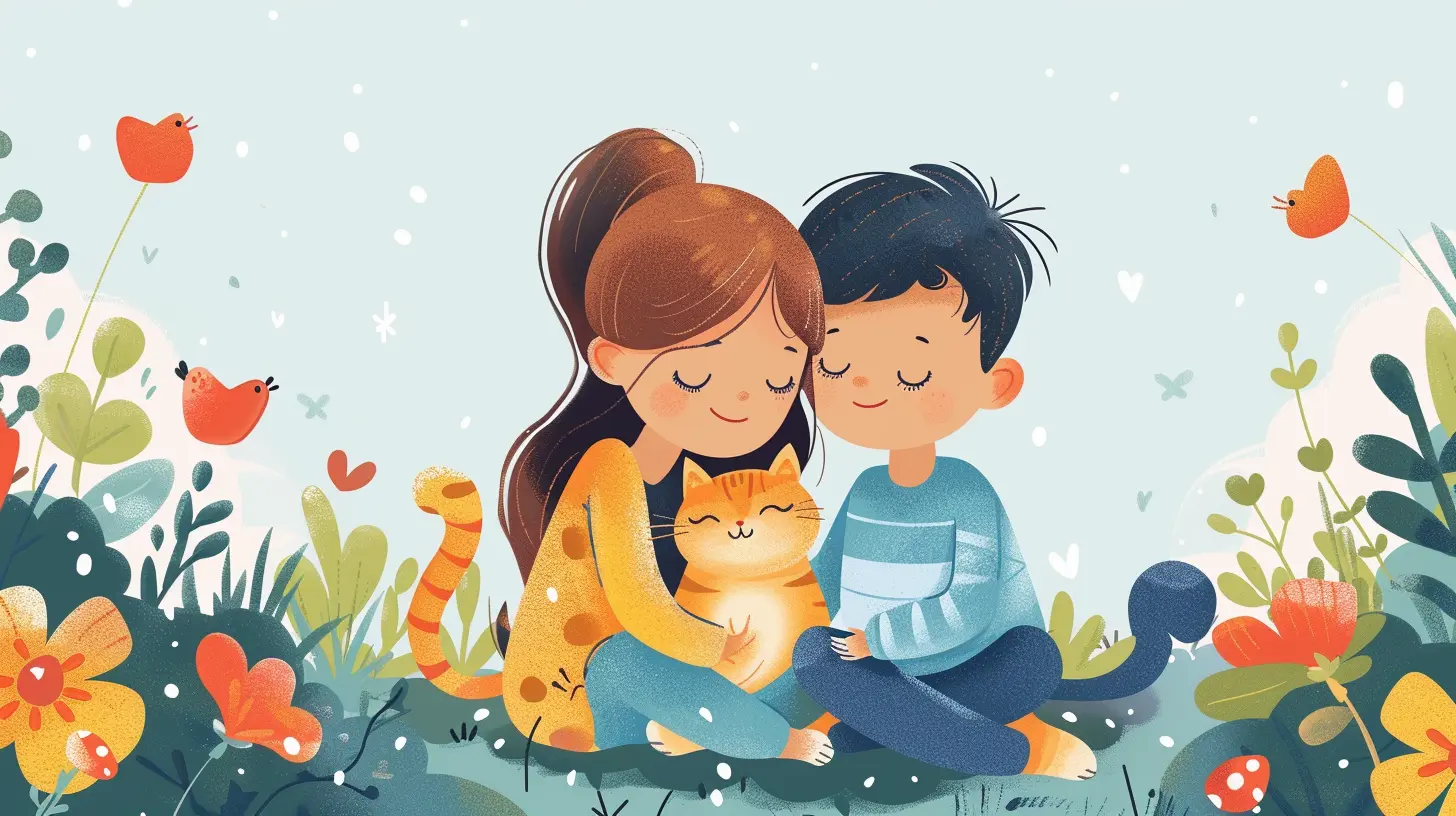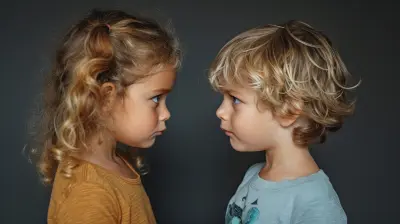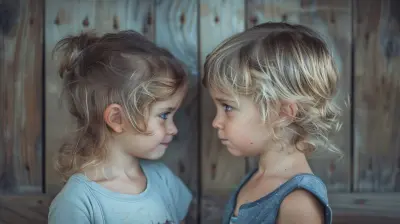Helping Your Child Navigate Friendships and Emotional Bonds
20 February 2025
Building and maintaining friendships is one of the most vital skills children develop as they grow. On top of that, emotional bonds play a huge role in shaping their social experiences, self-esteem, and life outlook. As a parent, you play a monumental role in helping your child understand and navigate these important relationships.
Friendships can be tricky for kids—they come with highs, lows, misunderstandings, and heartwarming moments. And let’s be real: watching your child go through both the joys and inevitable challenges can pull a string or two on your own emotions, right? So, how do you go about guiding your child through the colorful rollercoaster of friendship and emotional bonds? Let’s dive in!

1. The Importance of Friendships in Childhood
Friendships are more than just having someone to play with—children learn essential life skills from interacting with their peers. These relationships teach them about empathy, cooperation, and trust—qualities that will serve them well into adulthood.Also, children with strong friendships generally have better mental well-being than those who struggle socially. They’re less likely to feel lonely and more likely to develop a sense of belonging. Who doesn’t want that kind of happiness for their child?
But friendships, especially in childhood, don’t come without challenges. It’s important that, as parents, we help guide our children through the ups and downs of these social dynamics.
How Friendships Shape Development
Children’s friendships have a direct connection with their emotional and psychological growth. Through friendships, kids:- Learn to share and cooperate: It’s one thing to know how to share with siblings, but having to share on the playground? That’s a whole new level of cooperation!
- Develop empathy: Watching a friend feel sad or hurt helps children learn to pick up on emotions, and they begin to understand how to offer comfort and support.
- Gain social problem-solving skills: Misunderstandings in childhood friendships are common. Helping your child deal with these issues is key to helping them develop healthy conflict resolution skills.

2. Recognizing Early Signs of Friendship Struggles
Let’s paint a picture. Your child comes home one day looking downcast. When you ask what’s wrong, they shrug it off with an "I'm fine," but something in your parental instincts tells you otherwise.Often, kids struggle to vocalize what's happening in their social circles. It’s not uncommon for them to feel embarrassed or unsure of how to express feelings like loneliness or peer conflict.
Here are some early signs that your child might be struggling with friendships:
- Withdrawal: If your previously social child suddenly seems to prefer being alone more often, it could be a sign they’re having friendship issues.
- Mood swings: Frequent emotional changes, irritability, or sadness after school could signal that something’s wrong in their social world.
- Avoiding social situations: Declining playdate invitations or not wanting to attend birthday parties is another red flag.
Encouraging Open Communication
The key to helping your child navigate friendships is fostering an environment where they feel comfortable talking to you about their experiences. Easier said than done, right? Kids aren’t always forthcoming, and sometimes they don’t even realize what exactly is bothering them.Here’s how to ease that conversation:
- Don’t push too hard: Sometimes kids need space to work through their emotions before they’re ready to talk. Instead of diving in with a bunch of questions right away, let them come to you on their terms.
- Listen without judgment: When they do open up, let them know it’s a safe space, and you’re ready to listen without jumping in with solutions or scolding.
- Ask open-ended questions: Instead of asking, “Did something happen at school today?” try, “How did recess go today? Did anything fun or unexpected happen?”

3. Teaching Your Child to Build Healthy Friendships
So, your child is ready to make friends and strengthen emotional connections, but how do you help them build healthy and lasting relationships? As much as we’d love to step in and be their social coordinator, the best thing we can offer is guidance from the sidelines.Model Healthy Relationships at Home
Children mimic what they see. If they see you maintaining strong, healthy relationships, they’ll be more likely to apply those lessons when forging their own friendships.- Show empathy: Expressing kindness and understanding in your relationships sets an example for your child.
- Handle conflict well: Let your child see you resolve misunderstandings with patience and respect—whether it’s with a partner, friend, or colleague.
- Be inclusive: Show an openness to different types of people. This will encourage your child to form diverse friendships.
Encourage Kindness and Empathy
Friendship is a two-way street, and it’s important that your child learns that while it’s great to have a good friend, it’s just as important to be a good friend. Encourage behaviors such as:- Kindness: Small acts of kindness, like sharing or listening, go a long way.
- Empathy: Teach your child to try and put themselves in their friend’s shoes to understand how they might feel.
- Making amends: Mistakes happen. Teach them the importance of apologizing when they’ve wronged someone and how to genuinely make amends.
Help Them Handle Friendships That Change
One thing about friendships—especially young ones—is that they can change. It can be heartbreaking for a child to lose a friend or feel left out.Kids learn a lot about resilience and emotional bonds when navigating these changes. Talk to your child about how friendships can evolve naturally. Let them know that it’s okay if things change; it doesn’t always mean something went wrong, and it’s not a reflection of their worth.
Remind them, friends come in seasons sometimes, and that’s okay. It’s more important that they treat others with respect and kindness, even when a change in friendship dynamics occurs.

4. Supporting Your Child Through Friendship Challenges
All friendships will hit a few bumps in the road—arguments, misunderstandings, or even jealousy. How do you support your child when they face these challenges?Think of yourself as your child’s emotional coach. You’re not there to fix their problems for them (even though it’s tempting!), but you can give them the tools to navigate tricky situations.
Encourage Problem Solving
Teach your child to manage conflict on their own. You can guide them by discussing possible ways to handle conflicts, such as:- Expressing their feelings calmly: Encourage them to use "I" statements, such as “I felt hurt when you did that.”
- Compromising: Help them see that sometimes, making a compromise can help both parties feel better.
- Knowing when to walk away: If a friendship consistently brings stress or sadness, it’s okay to step back.
Teach Emotional Regulation
Kids are learning how to understand and manage their emotions. A lot of the time, outbursts or tears signal deeper feelings of insecurity, fear, or confusion. Show them how to identify and name their emotions—whether it’s sadness, frustration, or anger—and help them find healthy ways to cope.For instance, you might say, "It sounds like you're feeling really frustrated because your friend didn't want to play with you today. It's okay to feel that way!"
5. The Role of Boundaries in Friendships
As adults, we know the importance of boundaries, but it’s not always second nature to kids. Sometimes, children need help understanding that while they can care deeply for someone, they still need to respect their own limits and be mindful of others’ boundaries, too.Set Boundaries for Themselves
Help your child understand that good friends respect each other’s limits. If your child feels uncomfortable or pressured, teach them it’s okay to say "no." This doesn’t just apply to physical boundaries but emotional ones, too.They should feel empowered to say, "I don't want to play that game," or "It hurts my feelings when you tease me." Likewise, help them understand they should respect their friends' wishes and needs.
Set Boundaries with You
And yes, that includes having boundaries with you, too! As much as you want to dive into their friendships and help out, your child needs space to figure things out on their own (you’ll always be there if they need you, of course!). Let them come to you when they feel ready to ask for help or advice.
6. When to Step In As a Parent
It’s hard to watch your child go through tough social situations. You might be wondering: When do I step in?There’s a fine line between guiding from the sidelines and taking action. In general, stepping in should be reserved for situations where your child’s safety or mental health is at risk—such as bullying or extreme social isolation.
Recognizing Bullying vs. Typical Conflict
Disagreements and fights between kids are normal. However, bullying is a more severe, repeated behavior designed to hurt or control someone else. If your child is on the receiving end of bullying, it's time to talk to the school and take appropriate steps to ensure their safety and emotional well-being.Final Thoughts
Friendships are a beautiful and significant part of childhood, even with the inevitable ups and downs. By fostering open communication, teaching empathy, and providing the right tools to manage conflict and emotional bonds, you can help your child build meaningful and lasting relationships.Remember, parenting isn’t about solving every problem but giving your child the skills they need to navigate their own social world. And in the end, those emotional bonds they form will play a crucial role in shaping who they become.
all images in this post were generated using AI tools
Category:
Emotional DevelopmentAuthor:

Austin Wilcox
Discussion
rate this article
9 comments
Devin Lynch
Embrace their journey; friendships shape futures.
April 4, 2025 at 4:06 AM

Austin Wilcox
Absolutely! Friendships play a vital role in personal growth and development. Supporting your child's journey in building these connections can lead to lasting positive impacts on their future.
Regina McNaughton
Encourage open communication to strengthen their relationships.
March 21, 2025 at 3:28 AM

Austin Wilcox
Absolutely! Open communication fosters trust and understanding, essential for nurturing strong friendships and emotional connections.
Niko Maddox
Navigating friendships is essential for your child's emotional development. Encourage open communication, teach empathy, and model healthy relationships to help them build strong, supportive connections with peers throughout their lives.
March 9, 2025 at 4:38 AM

Austin Wilcox
Thank you for your insightful comment! I completely agree—open communication and empathy are key to fostering strong, healthy friendships in children.
Jett Nelson
Thank you for sharing these valuable insights! Helping children build strong friendships is essential for their emotional growth and well-being.
March 6, 2025 at 3:27 AM

Austin Wilcox
Thank you for your kind words! I'm glad you found the insights helpful—strengthening friendships is indeed vital for children’s emotional development.
Starling Jimenez
Navigating friendships and emotional bonds is a vital part of childhood. Your guidance can empower your child to build meaningful connections. Remember, fostering open communication and empathy will equip them with the skills to thrive in their relationships. Keep supporting them!
March 3, 2025 at 4:08 PM

Austin Wilcox
Thank you for your insightful comment! I completely agree—open communication and empathy are key in helping children form strong, meaningful relationships. Your support makes a significant difference!
Alessia Griffin
This article offers practical advice for fostering healthy friendships and emotional connections in children—very helpful!
March 1, 2025 at 4:57 AM

Austin Wilcox
Thank you! I'm glad you found the advice helpful for nurturing your child's friendships and emotional well-being.
April Watson
Great tips! Essential for fostering healthy relationships.
February 25, 2025 at 5:27 PM

Austin Wilcox
Thank you! I'm glad you found the tips helpful for nurturing strong relationships.
Rachel Pratt
Empowering connections shape our children's happiness and growth.
February 22, 2025 at 3:27 AM

Austin Wilcox
Absolutely! Fostering strong connections is crucial for children's emotional well-being and personal development.
Valentina Malone
How can we best support our kids in building lasting friendships?
February 20, 2025 at 5:04 PM

Austin Wilcox
Encourage open communication, model positive social interactions, and create opportunities for your child to play and engage with peers.
MORE POSTS

Simple DIY Toddler-Friendly Montessori Activities

How to Set Healthy Boundaries Between Siblings

The Link Between Sibling Rivalry and Parental Involvement

Teaching Kids to Recognize Fake News and Misinformation

Using Chores to Build Your Child’s Confidence and Self-Esteem

How to Help Your Teen Manage Stress and Anxiety

Encouraging Independence While Maintaining Boundaries